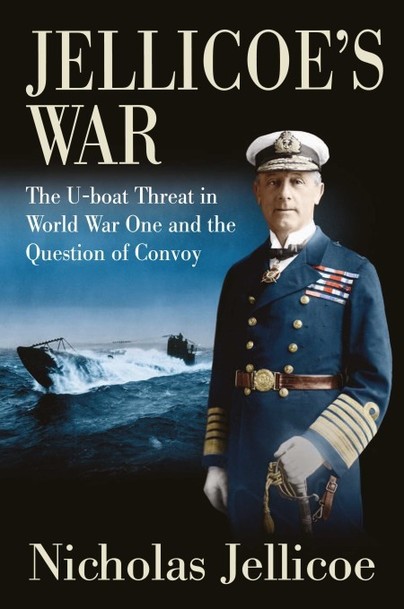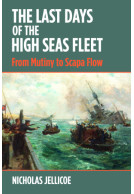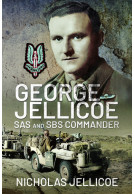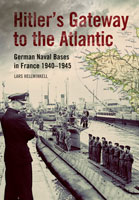Jellicoe's War (Hardback)
The U-boat Threat in World War One and the Question of Convoy

Pages: 480
Illustrations: 32 mono illustrations
ISBN: 9781036109028
Published: 18th November 2024
(click here for international delivery rates)
Order within the next 10 hours, 10 minutes to get your order processed the next working day!
Need a currency converter? Check XE.com for live rates
| Other formats available | Price |
|---|---|
| Jellicoe's War eBook (9.9 MB) Add to Basket | £18.99 |
In February 1917, German U-boats launched a savage unrestricted campaign against both Allied and neutral shipping. At its peak in April, 860,000 tons of Allied merchant shipping was sunk. Britain’s supremacy at sea was being severely challenged and with it the chances of victory in the wider war.
Taking up the challenge was Britain’s new First Sea Lord, Sir John Jellicoe, until the previous December C-in-C of the Grand Fleet – famously described by Churchill as the only man who could have lost the war in an afternoon. The battle he now faced was equally critical, although the timeline of defeat was a matter of months rather than hours – Britain’s food stocks were dangerously low with wheat reserves down to six weeks and sugar to only two, while wide-scale shortages were crippling the industrial economy.
Jellicoe outlined the gravity of the situation with total candor to Rear Admiral William Sims, USN, sent over before America officially declared war by Franklin Roosevelt, the Assistant Secretary of the Navy. The two men already knew each other from service together in China during the Boxer Rebellion, so Jellicoe’s plea for urgent American assistance was taken seriously by Sims. After the USA joined the war in April 1917, together they lobbied Washington for aid, addressing their needs directly to two reluctant Anglophobes at the head of the USN, Secretary of the Navy, Josephus Daniels and Chief of Naval Operations, William Benson.
Clearly, a radical new approach to anti-submarine warfare was called for, and Convoy was the leading contender. There were many objections to protecting shipping in this way, some ideological but most practical – a workable system, for example, effectively required state control of both shipping and distribution networks, something inconceivable in normal circumstances. However, Convoy had powerful advocates, including the Prime Minister, Lloyd George, who later claimed he had personally forced its adoption on a reluctant Admiralty. This self-serving political myth cast Jellicoe as an opponent of Convoy: nothing could be further from the truth.
As both Jellicoe and Sims understood, the key requirement was a rapid increase in the number of destroyers for escort duties. America provided them, the first arriving in Queenstown, Ireland on 4 May and by June 46 were operating in European waters. This was the first step in an Anglo-American campaign that gradually brought the U-boat threat under control and led to its ultimate defeat.
This book takes a fresh look at the undersea war as a whole and all the complex factors bearing on the campaign, only one of which was convoy. Its analysis is original, and its conclusions thought-provoking – an important contribution to the naval history of the Great War.
"Nicolas Jellicoe's account is as good as it gets on the subject and, in his final assessment of his esteemed grandfather, can be considered definitive and so is highly recommended."
Warships International Fleet Review, October 2025
"I really enjoyed reading Jellicoe’s War and found it extremely stimulating, especially as it tells the history of the U-boat war 1914-18 from the point of view of both sides, which is new. I also found it very interesting how controversial the introduction of the convoy system was still being discussed in the Admiralty in 1917 and how Sir John Jellicoe became convinced that there was no alternative. The significant role played by the USA's entry into the war is also made very clear here. Of course, the Royal Navy lacked escort ships for its many tasks and the many convoys. Now, from April 1917, these ships were ready and the success of the convoys was resounding, but you have to realize that first. The book is worth the read and knowledgeable. I recommend it."
Dr. Axel Grießmer, Internationales Maritimes Museum, Hamburg
"Marvellous."
The Naval Review
Read the full review here
"… meticulously researched and, unlike other attempts to simply document the tonnage achieved by German U-Boats in the First War, this book weaves together hundreds of stories of both cruelty and bravado on the high seas."
Admiral Jamie Foggo III USN ret’d
"For those seeking a ‘Deep Dive’ into the U-Boat war of 1914-18, Jellicoe’s War is for you."
Australian Naval Institute
Read the full review here
The sub title is “the U-Boat threat in WW1 And the Question of Convoy”. For the first nearly 2½ years of the war, merchant ships had sailed independently, relying on speed and luck to avoid submarines. As late as January 1917 the Admiralty had not recommended convoys, seeing large concentrations of ships as making successful submarine attack more likely. However, with growing losses of merchant ships, pressure was mounting on the Admiralty to adopt convoys, not least from Prome Minister Lloyd George. Jellicoe, who was now First Sea Lord, is often accused of obfuscating on the question of convoys but this book seeks to correct this. Jellicoe wasn’t opposed to the convoy system but he was only too well aware of the need to consider all the implications.
Peter Wykeham-Martin
Nick Jellicoe’s latest book traces how Jellicoe from his time as CinC Grand Fleet was concerned about the submarine threat but was frustrated by the lack support for increased anti submarine forces and weapons. It was not only the threat to merchant shipping. In August 1916, Scheer laid a U-boat trap for the Grand Fleet with the High Seas Fleet working with Zeppelins and U-boats and whilst no major units were lost, Jellicoe had to restrict the Grand Fleet’s operations. Returning to the Admiralty in November 1916 as First Sea Lord, Jellicoe found that there was little understanding of the problem and little constructive policy; ASW tactics were “ramming, gunfire and nets”. However, the entry of America to the war provided vital number of destroyers and escorts. Another issue was getting merchant ships to comply with convoy requirements, something doubted by both the Admiralty and the Merchant Service. But in April 1917, Jellicoe decided to test the convoy system with promising results and in May the Admiralty agreed to introducing convoys. This belies the accusation of obfuscation. Yes, the Admiralty memo of January 1917 arguing against convoys was published on Jellicoe’s watch but he said he hadn’t endorsed that, and perhaps it is fairer to note that when he had the resources, he was quick to implement the convoy system.
Although the convoys and improved ASW saw a dramatic reduction in merchant ship losses by November 1917, Jellicoe was under increasing political pressure and in December 1917 was fired and replaced by Beatty. Nick Jellicoe has produced a deeply researched and highly readable book on the introduction of the convoy system. Did Jellicoe’s micro-management style cause unnecessary delay to its introduction or was he ensuring that the right resources were in place? As with Jutland, if Jellicoe got it wrong, Britain could lose the war. Jellicoe was said by Jackie Fisher to be a fighting Admiral wasted in London, not an unfavourable assessment of a “widely respected, highly credible professional naval officer”. Another masterly book from Nick Jellicoe - fascinating and stimulating covering not just the convoy debate side pieces on U-boat action accounts and technical explanations – very highly recommended.
About Nicholas Jellicoe
Nick Jellicoe studied Chinese politics before working in advertising, in American Express’s European marketing group and running global communications for Rolex.
He has written about his grandfather Admiral Sir John Jellicoe who commanded the Grand Fleet at Jutland in Jutland – The Unfinished Battle, the scuttling of the German Navy in 1919 in The Last Days of the High Seas Fleet and his father George Jellicoe. An early member of the Special Air Service as David Stirling’s 2iC, his father commanded the SBS in the Aegean and later went into politics. He fittingly became the last holder of the office of First Lord of the Admiralty. His next book, Jellicoe’s War, to be published in October by Seaforth Publishing, deals with Admiral Jellicoe’s war against the U-boat threat in the First War.
Nick is a frequent presenter on TV and radio and works closely with a number of naval and maritime museums. He is a Vice Patron of the Royal Naval Benevolent Trust and the Maritime Archaeological Trust. He lives with his wife and one of their two daughters in Switzerland.


















